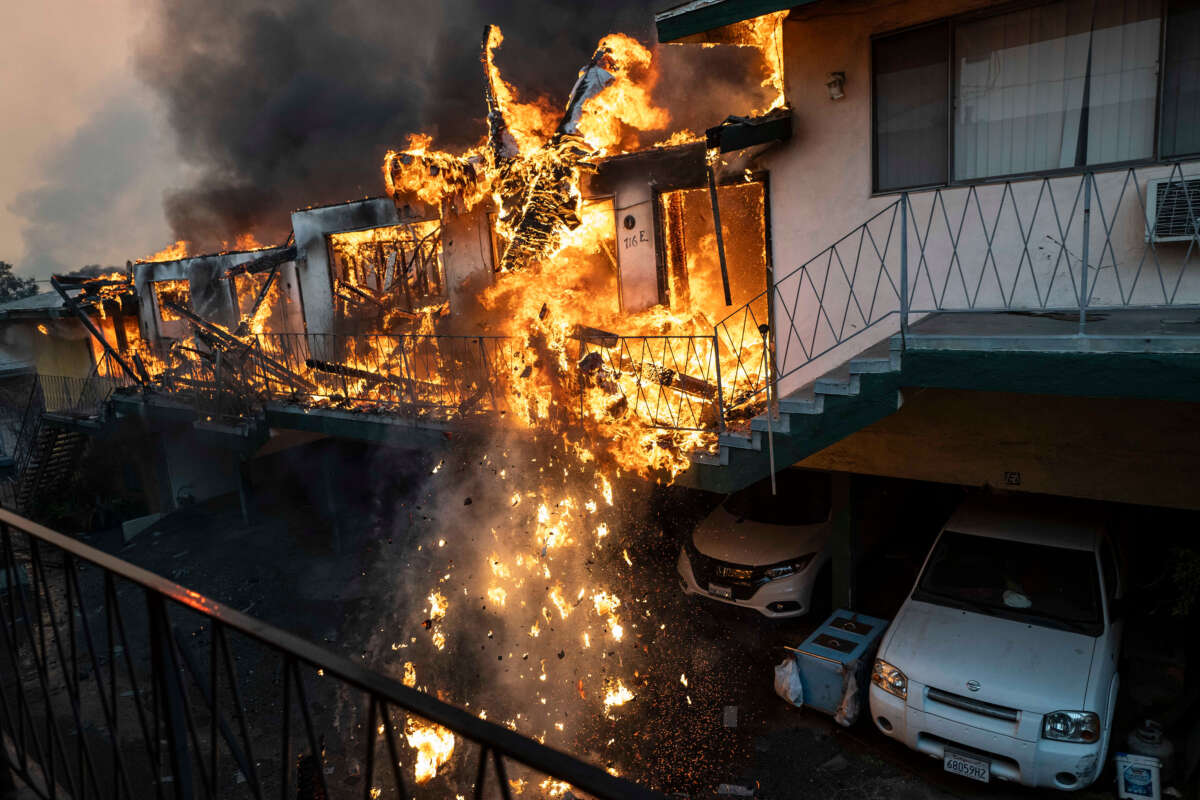A new report suggests that the global climate crisis played a significant role in increasing the likelihood of the recent wildfires that ravaged the Los Angeles area.
The report from World Weather Attribution, a coalition of scientists who examine extreme weather events and disasters to understand the role that the climate crisis played in their intensity and likelihood, was published on Tuesday. The report noted that “human-induced climate change is increasing wildfires in many regions of the world, as hot, dry and windy weather conditions increase the risk of fires both starting and spreading.”
Before the industrial revolution, global average temperatures were 1.3 degrees Celsius lower than they are now. The increase means that the “conditions that drove the LA fires are [now] expected to occur on average once in 17 years,” the report said.
These conditions increased the likelihood of the Los Angeles wildfires by “about 35 percent,” the report said. The climate crisis was also responsible for a 6 percent increase in the severity of the fires compared to pre-industrial levels.
The World Weather Attribution report further recognized that “the elderly, people living with disability (especially limited mobility), lower-income people without personal vehicles, and population groups that received late warnings were disproportionately impacted, as they had a more difficult time getting to safety.”
This report comes the same week that lawmakers in California’s state legislature introduced a bill that would require contributors to the climate crisis to pay for damages that result from wildfires in the state.
Senate Bill 222 would allow individuals and insurance agencies to sue fossil fuel companies for damages that occur as a result of wildfires in California. The bill’s author, State Sen. Scott Wiener (D), explained that while California residents are “paying for these disasters,” there “is one stakeholder that is not paying: the fossil fuel industry, which makes the product that is fueling the climate change.”
Wiener’s proposal notes that the oil industry has known for decades that burning fossil fuels contributes to the climate crisis. It also states that wildfires, like those in Los Angeles this month, cost billions of dollars in damages, and that natural disasters in general are creating an insurance market crisis, with insurance companies increasing rates, limiting coverage for some people’s property, or pulling out completely from regions where wildfires are more prone to occur.
“Californians are bearing these costs with explosive insurance premium increases that make CA less affordable. That has to change,” Wiener said in a subsequent Bluesky thread, adding that the bill would “finally force the fossil fuel companies to be part of the solution, instead of dumping this burden on policyholders.
“It will help make people whole for their losses from climate disasters. And it will help improve insurance affordability,” he added.
In an article for Truthout last week, freelance writer Tyler Walicek suggested that such a bill in California could work the same way a recently enacted “superfund” law in New York does. That law, and Wiener’s bill, could also be replicated at the federal level.
The oil industry has long hewn to the classic formula of privatizing the profits and socializing the costs, continuing to amass obscene returns while knowing full well that the price is a livable planet. Climate Superfund legislation represents a robust means of rebalancing such warped excesses.
Angry, shocked, overwhelmed? Take action: Support independent media.
We’ve borne witness to a chaotic first few months in Trump’s presidency.
Over the last months, each executive order has delivered shock and bewilderment — a core part of a strategy to make the right-wing turn feel inevitable and overwhelming. But, as organizer Sandra Avalos implored us to remember in Truthout last November, “Together, we are more powerful than Trump.”
Indeed, the Trump administration is pushing through executive orders, but — as we’ve reported at Truthout — many are in legal limbo and face court challenges from unions and civil rights groups. Efforts to quash anti-racist teaching and DEI programs are stalled by education faculty, staff, and students refusing to comply. And communities across the country are coming together to raise the alarm on ICE raids, inform neighbors of their civil rights, and protect each other in moving shows of solidarity.
It will be a long fight ahead. And as nonprofit movement media, Truthout plans to be there documenting and uplifting resistance.
As we undertake this life-sustaining work, we appeal for your support. Please, if you find value in what we do, join our community of sustainers by making a monthly or one-time gift.
